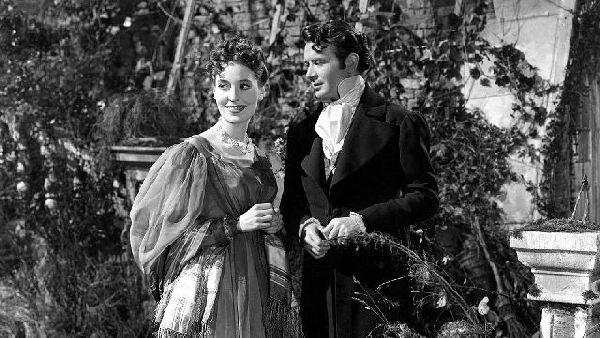Great Expectations (1946) 
“Great Thrills! Great Romance! Great Suspense! Great Adventure!”

Director: David Lean
Cast: John Mills, Valerie Hobson, Tony Wager
Synopsis: A humble orphan suddenly becomes a gentleman with the help of an unknown benefactor.
Widely praised as arguably the greatest screen adaptation of a Dickens novel, David Lean’s Great Expectations also illustrates the impossibility of faithfully adapting the writer’s huge tomes for the cinema. Dickens’ works are these days more suited to the medium of television, for mini-series that can run for 8 or 9 hours and therefore capture the richness not only of the major characters, but also the small army of minor ones who are so important to his stories’ atmosphere and depth. To condense a 500 page story to less than two hours screen time, as Lean as done here, would seem to be a short cut to desecration of a major work, but apart from an ill-conceived (but cinematically necessary) alteration to the conclusion of Dickens’ work, Lean somehow manages to create a picture that at least remains true to the spirit of the author’s work.
Great Expectations follows the fortunes of Pip (Tony Wager), a young boy when we meet him in a haunting opening shot as he runs across a bleak, flat landscape, and past dark gallows to visit the grave of his parents. While at the graveside, he’s accosted by Magwitch (Finlay Currie — Seven Waves Away, Murder at the Gallop), an escaped convict who intimidates the young boy into stealing food for him from the pantry of his shrewish older sister (Freda Jackson — Bhowani Junction) and her kindly husband, Joe (Bernard Miles). Shortly after he delivers the food, Magwitch and a fellow escapee are both arrested. Then, a short while later, Pip is summoned to play at the house of Miss Faversham (Martita Hunt — Anastasia, The Admirable Crichton), an embittered old woman who was jilted on her wedding day and has lived in her wedding dress ever since. Upon visiting her mansion, Pip finds Miss Faversham sat at the cobweb-strewn wedding banquet table upon which rats feed at the mouldering wedding cake that sits upon it. She’s accompanied by Estella (Jean Simmons — So Long at the Fair), a mean and spiteful girl with whom Pip nevertheless instantly falls in love.
Six years later, Pip (now played by John Mills — I Was Monty’s Double) is working as Blacksmith Joe’s apprentice when he receives a visit from a Mr Jaggers (Francis L. Sullivan — 21 Days), a London solicitor who informs him that a mysterious benefactor has provided the necessary funds to finance Pip’s education and training as a gentlemen in London. Naturally, Pip jumps at the chance, and assumes that the benefactor is Miss Faversham, but after having established himself in London and re-invented himself as a foppish gentleman, he discovers that his benefactor isn’t who he thought it was.
Great Expectations is one of the few Dickens cinema adaptations that makes an attempt to retain something of Dickens’ florid Victorian dialogue, and Lean, together with Ronald Neame and Anthony Havelock-Allan do a good job of preserving the flavour of Dickens’ dialogue while still making it palatable to a modern audience. Shorn of the author’s verbose style, the movie also delivers a fast-moving story strongly anchored in the era in which it takes place. Although the supporting cast is strong — Francis L. Sullivan, in particular, makes an impression as the giant, no-nonsense lawyer Jaggers, a role which he’d already played on screen in the 1934 version — both John Mills and Valerie Hobson, who plays the adult Estella, are miscast. At 38, Mills was too old to play the part of a 21-year-old, and Hobson lacked the kind of presence and beauty necessary to make Estella’s power over men believable. Ironically, the seventeen-year-old Jean Simmons, who plays the young Estella, is perfect in her part.
Judged as a faithful adaptation of Dickens’ book, Great Expectations has to be considered a failure because too many important characters have their roles vastly reduced, or are excised from the book entirely. And rather than being primarily an observer of those around him, as Pip is in the book, in the film he becomes the protagonist around which those characters now revolve. As a film in its own right, however, Great Expectations remains a prime example of just how good the British film industry was at identifying the heart of a story and transferring it to the screen.
(Reviewed 8th August 2014)
httpv://www.youtube.com/watch?v=HbSib00NgiI
